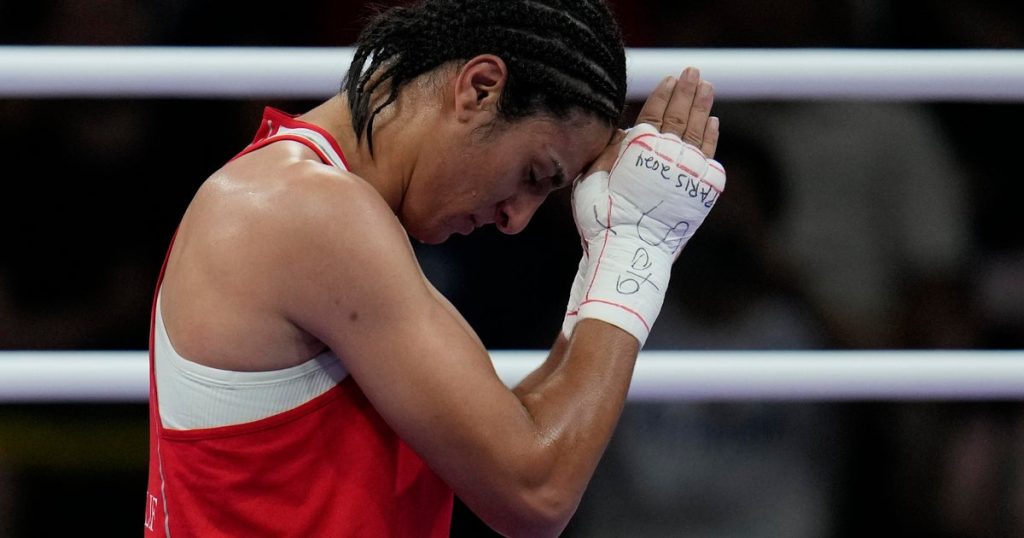Olympic gold medalist Imane Khelif will be prohibited from participating in any World Boxing competitions until she undergoes newly mandated genetic sex testing. This decision, announced by World Boxing on Friday, comes as the organization seeks to enforce mandatory sex testing to ensure the eligibility of male and female boxers in their events. The move is partly a response to concerns raised following Khelif’s recent gold medal win at the Paris Olympics.
| Article Subheadings |
|---|
| 1) Events Leading to the Announcement |
| 2) Details of the Genetic Testing Protocol |
| 3) Implications for Khelif’s Career |
| 4) Broader Context of Gender Testing in Sports |
| 5) Reactions from Sports Authorities |
Events Leading to the Announcement
The decision to ban Imane Khelif from World Boxing competitions reflects ongoing discussions about gender identity and athlete eligibility in sports. Following her victory at the Paris Olympics, Khelif’s participation in upcoming events, such as the Eindhoven Box Cup scheduled for June 5-10, 2025, raised questions among officials. These concerns were exacerbated by her previous disqualification from the International Boxing Association’s world championships, where she faced scrutiny regarding her eligibility based on gender-related issues.
World Boxing indicated that they contacted the Algerian Boxing Federation to inform them that Khelif would not be allowed to compete in the female category until she underwent the mandated genetic testing. This decision underscores the significance of fairness and safety in the sport as they navigate the complex nature of gender identity within competitive boxing.
Details of the Genetic Testing Protocol
World Boxing has laid out a comprehensive protocol that mandates the genetic testing of athletes who compete in its events. The testing involves a polymerase chain reaction (PCR) test to establish an athlete’s sex at birth. The process can be conducted through various methods, including nasal or mouth swabs, saliva samples, or blood draws. One of the critical elements of this testing is to examine the Y chromosome’s presence, which ultimately determines biological sex.
According to a study published in a scientific journal, the PCR test has demonstrated high accuracy rates in determining biological sex, achieving up to 97% accuracy in adults. The implications of implementing these stringent testing measures are significant, as they aim to preserve the integrity of competitions while addressing the concerns surrounding gender identity.
Implications for Khelif’s Career
Following the announcement, Imane Khelif faces an uncertain future in her boxing career. The prohibition from competing in female categories significantly impacts her opportunities for recognition and advancement in the sport. The testing results will play a crucial role in determining her eligibility moving forward. As she navigates this intricate situation, her reputation and career trajectory hang in the balance.
Despite achieving a remarkable milestone by securing a gold medal at the Olympics, Khelif now faces challenges that may overshadow her athletic accomplishments. The psychological and emotional toll of this situation cannot be understated as she confronts public scrutiny and the demands of compliance with World Boxing’s new regulations.
Broader Context of Gender Testing in Sports
The issue of gender testing in sports is not new, but it has gained prominence in recent years as the conversation around gender fluidity and inclusion becomes more pronounced. Sporting bodies are increasingly grappling with the complexities of ensuring fair competition while respecting athletes’ rights and identities. The mandate from World Boxing reflects a trend seen across various sports, where similar disputes over eligibility have led to calls for stricter testing protocols.
As these debates continue, the balance between competitive fairness and personal dignity remains a contentious subject. Critics argue that such testing can stigmatize athletes and lead to invasions of privacy, while proponents believe these measures are essential to maintain a level playing field.
Reactions from Sports Authorities
The reaction from sports authorities and the general public has been mixed in response to World Boxing’s announcement. Some advocates for gender equality in sports have expressed concerns about the implications of genetic testing, arguing that these measures could perpetuate discrimination against transgender athletes and those with intersex variations. Others emphasize the necessity of such protocols to maintain the integrity of competitions.
Officials from the Algerian Boxing Federation were approached for comments regarding the situation, and many stakeholders within the boxing community are closely monitoring developments as they unfold. As testing begins on July 1, 2025, the outcomes will likely have lasting effects on the landscape of boxing and its governing organizations.
| No. | Key Points |
|---|---|
| 1 | Imane Khelif is banned from World Boxing events until she undergoes genetic testing. |
| 2 | Mandatory sex testing protocols will come into effect on July 1, 2025. |
| 3 | World Boxing cites concerns about fairness and safety in the sport as reasons for testing. |
| 4 | Genetic testing involves a PCR method to establish an athlete’s sex at birth. |
| 5 | Reactions from various stakeholders highlight the ongoing debate surrounding gender identity in sports. |
Summary
The decision by World Boxing to impose genetic sex testing represents a significant turning point in the realm of boxing and gender identity. As Imane Khelif faces restrictions on her participation in competitions, this development emphasizes the necessity for sports organizations to navigate complex issues surrounding fairness and athlete rights. The path ahead remains uncertain, but it promises to influence future policies and discussions surrounding gender in competitive sports.
Frequently Asked Questions
Question: What prompted the genetic testing requirement?
The requirement for genetic testing was prompted by concerns over eligibility and fairness in competitions, particularly following Imane Khelif‘s recent gold medal win at the Paris Olympics.
Question: How will the genetic testing be conducted?
The genetic testing will utilize a PCR method that can be performed via saliva, blood, or swabs to determine an athlete’s sex at birth.
Question: What is the timeline for the implementation of the mandatory testing?
The mandatory genetic testing protocols are set to begin on July 1, 2025.
